


Framed or unframed, desk size to sofa size, printed by us in Arizona and Alabama since 2007. Explore now.
Shorpy is funded by you. Patreon contributors get an ad-free experience.
Learn more.

- Details, Details
- What's that building to the left of the tower?
- Coal Barges
- Bromo-Seltzer
- Inner harbor
- The Basin
- What a headache!
- Giant stepladder?
- Baldwin 62303
- Baldwin VO-1000
- Cold
- No expense spared
- Tough Guys
- Lost in Toyland
- And without gloves
- If I were a blindfolded time traveler
- Smoke Consumer Also Cooks
- Oh that stove!
- Possibly still there?
- What?!?
- $100 Reward
- Freeze Frame
- Texas Flyer wanted
- Just a Year Too Soon
- WWII -- Replacing men with women at the railroad crossing.
- Yes, Icing
- You kids drive me nuts!
- NOT An Easy Job
- I wonder
- Just add window boxes
Print Emporium
Slaves Reunion: 1916
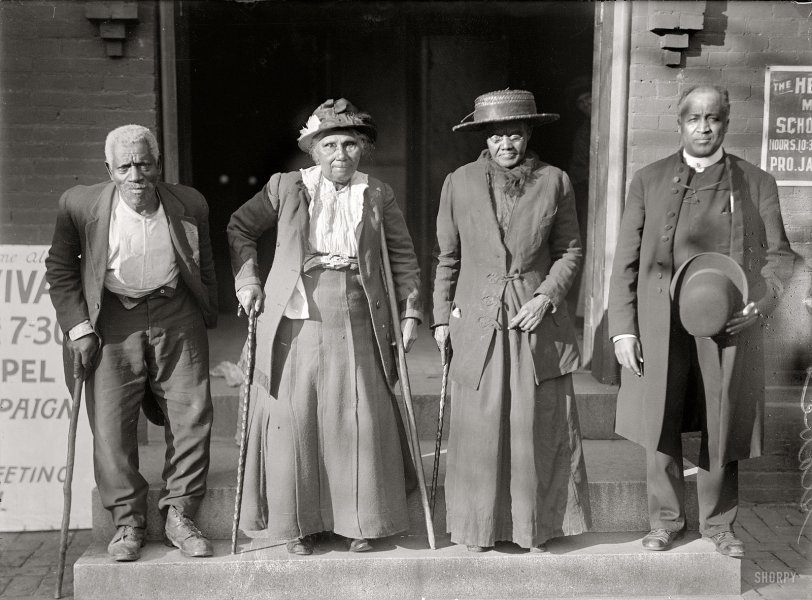
Washington, D.C., circa 1916. "Slaves reunion. Lewis Martin, age 100; Martha Elizabeth Banks, age 104; Amy Ware, age 103; Rev. Simon P. Drew, born free." Cosmopolitan Baptist Church, 921 N Street N.W. View full size.
Looking good...
They all look great despite the presence of canes, and Mr. Martin in particular does not at all look his 100 years! In fact he looks downright jaunty in his bibbed-shirt and casual, tie-less rumpeledness ... on the subject of not-that-far-removed-from, my late grandfather fought in the Boer War (1899-1902), and I am only 39!
[Interesting. I'm not that much older than you, and my maternal grandfather was born in 1876. - Dave]
Not that long ago at all
Indeed, not that long ago. My great-grandfather fought for the Confederacy. He married a 15 year old girl in Appalachia when he was 64. Their youngest son -- my grandfather -- is still alive.
Slave narratives
For more first-person accounts, read "The Slaves' War: The Civil War in the Words of Former Slaves" by Andrew Ward. My great-great grandfather was an 18-year-old Confederate soldier at the end of the war (as a Quaker he drew guard duty) who died when my grandfather, now 93, was about 14. These stories aren't that removed from current generations!
WPA interviews
The text of the interviews is available at www.gutenberg.org . The interviewers preserved the spoken dialect of the person interviewed.
My Mamie
I was raised for a good part of my young formative years by a Black Mamie born of slaves. To her though she was a paid part of our household I was indeed her daughter. We laughed together, cried together, fought and played together. She talked often of her early years and I listened often to the stories of her parents and the tales they had to tell of being freed slaves on farms. My Mamie herself recounted stories not only of her parents trials but her own, having to sit in the back of a bus or only use public restrooms marked for colored use or restaurants that would and would not serve coloreds. My Mamie was always my best friend and her wisdom still followes me down through the years. I will always take it as an honor that she thought of me as her white daughter...my beautiful kind and wise Mamie.
[Her name was Mamie? Like Mamie Eisenhower? Or do you mean mammy. - Dave]
Not so lost
During the Great Depression, one of the government works projects (I want to say as part of the WPA) sent people out to interview and record the life stories of former slaves.
So no... not all of that history... thank God... has been lost.
Born in 1810
The thing that amazes me as well as everyone else's musings is that we're looking at a "modern" photo of someone born in 1812. The changes that person would have seen are simply mind-boggling. Even from a technology standpoint. James Madison was president when they were born, and America was only 36 years old. And here they are in a relatively "modern" photo. Totally amazing.
[That is so very true. Over the span of a lifetime, they saw the introduction of: electricity, instant communication first by telegraph, then telephone, then wireless telegraph; travel by train, motorcar and airplane. All pretty big compared to what we think might think of as the changes that have affected our lives -- cellphones, the Internet, GPS navigation. - Dave]
The Elders
Joe, I grew up with one of "The Elders" around the family being a daughter of a slave (even though it was the 1970s and 1980s, she was quite elderly, having been born in the 1890s). She had nothing but GOOD things to say about the "White Folk" who had her as a part of our extended family; not because we were white, but because we treated her with grace and dignity. I once asked her, as a child, during the height of the "Black Power" movement, what she thought about the whole issue, and she harked back to something her mother had told her about her life as a slave (her mother had been born in the mid 1850s). She said that some white folks treated "colored" (her word) as inferiors; others treated them as trusted friends and even as family. When she found folks who treated her poorly, she simply remembered those who treated her well, and moved along. Most slave owners weren't big plantation owners; they were small farmers, with one or two slaves at most. As such, when the slave was toiling doing work, the slave owner was normally working beside the slave, doing the same work. When it came time for dinner, there was one meal that was made for everyone, and in some families, there was one meal SERVED, as well, meaning the slave ate with the family as one of them. Those who grew up in those relationships frequently had FOND memories of their former owners. Sure, they wanted to be free... just like a teenager eventually wants to be free from his family. That's one of the reasons that in the immediate aftermath of the Civil War, so many former slaves never left the family they had always been with; they were treated as one of the family to begin with, so why would they leave now, when the choice was now THEIRS to make, and not someone elses?
That said, sure, there are plenty of horror stories about slavery, too... but it's perfectly understandable, to me, that some of the slaves would appreciate a reunion with their former owners, especially with free food.
Slaves and Slave Owners
In the 1950s, I grew up in a strictly segregated community in Maryland. Some of the teachers in my school (the white school) poured out plenty of propaganda and revisionist history about slave owners being good to their slaves, that it was not as bad as it was made out to be. Undoubtedly, there were some slave owners who were kinder than others, and some who had something approaching a respectful, even affectionate relationship with their slaves. But no matter the quality of that relationship, it was one that was forced upon the slaves. They had no choice in the matter. Nothing can change that fact.
Not so peculiar
The problem with any "general" discussion of slavery is that most of what people "know" is wrong. Try Googling "Irish Slaves" and the first hit, from the Kavanaugh family, does a decent job of tracing the beginnings of North American slavery.
Try the "Politically Incorrect Guide to the South" for more reasonably accurate information. Mix a little from other history books, including the fact that most African slaves went to South and Central America - and many of the mixed race slaves from the collapse of the "Barbadoes Plantation" wound up in North America. And you might begin to have a clue to the peculiar institution.
Now, I'm old enough to have known both black men born slaves and whites born to slave holders. There was far more respect and affection between these men who were raised together than anyone today seems to want to admit.
So I can easily believe that when Jefferson Davis made a speech in Vicksburg, his former slaves made what was then an arduous trip to shake his hand.
Voices of Slavery
Much like the attempts to document life through photography undertaken by the WPA and the FSA, attempts were made to record audio interviews for inclusion at the American Folklife Center (with copied deposited at the Library of Congress).
Voices from the Days of Slavery:
http://memory.loc.gov/ammem/collections/voices/
"Twenty-three interviewees, born between 1823 and the early 1860s, discuss how they felt about slavery, slaveholders, coercion of slaves, their families, and freedom."
(I believe the other three interviews are unintelligible and have not been transcribed or digitized).
Lost histories
I wonder if anyone ever interviewed and recorded the innermost thoughts and opinions of these men and women after Emancipation to find out how they felt about everything they had experienced. It is too bad that young people are not very interested in their factual histories, but I am speaking for myself here. Even though my grandfather from Poland had lived a very colorful and adventurous life, both there and in the USA, I never wanted to listen to his tales and had hipper, cooler things to do with my time. Now I look at the old pictures he had stored away and wonder what was going on and where it was. Anyone who has a living link to the past is missing an opportunity if they do not talk with and record what their elders have to say. Nobody knows the troubles they've seen...
Beyond imagining
I can't help but pause and wonder what these folks would say, if they knew what was happening in the country tomorrow.
Slaves and owners
I guess maybe it's a bit like the people who fought each other on different sides in wars having reunions, which I have heard of happening.
Generation gap
I've often wondered about the generation gap in families where the parents had been born slaves, but the children had been born free. I can't wrap my head around it.
A Colorful Gene Pool
These are some tough customers! When I view this image I see the manifestation of robust, beautiful genes ... along with the intention to endure, no matter what. Bravo Lewis, Martha, Amy and Simon.
Dave, today is a good choice for posting this.
Tom - SoCal
A Peculiar Institution
I find it so strange that a reunion would include both former slaves as well as former owners. Peculiar indeed.
Local News Briefs
The fifty-fourth annual convention of "Ex-Slaves" will be held October 22 to October 30, at the Cosmopolitan Baptist Church, this city. The arrangements for the gathering are being made by the White Cross National Colored Old Folks Home Association, which has promised a free dinner to the former slaves, each day of the convention. The Rev. S.P.W. Drew, president and founder of the White Cross organization, is taking an active part in the completion of arrangements. Committees to look after the deails of the convention and to make arrangements for housing the delegates were appointed at a mass meeting held last night at Cosmopolitan Church.
Washington Post, Sep 23, 1916
Former Slaves' Reunion Closes Today
The fifty-fourth national reunion convention of ex-slaves and former owners will close today. Special services have been held in Cosmopolitan Baptist Church since October 22. It is stated that besides the friendly greetings at the church and the universal hospitality of the Washington colored people in their homes, 7.000 free dinner tickets have been distributed among the poor.
Washington Post, Nov 6, 1916
Church still there
There's still a church in that location, but the doorway looks somewhat different.
[This is not the same church. Cosmopolitan Baptist was torn down in 1925. - Dave]
How excited they would be!
These dignified and long-suffering people from so long ago would be excited beyond belief by the news that a black man will be inaugurated as President of the United States this week. How, they might ask, could such a wondrous thing come to pass? It's the same question being asked by the aging leaders of the Civil Rights movement of the 1960s. The knowledge we have of that amazing event to come makes this photo all the more compelling, all the more important.
Work related
Knowing how hard these folks must have had to work all their lives, one wonders how they reached the century mark. Or is that how they did it?





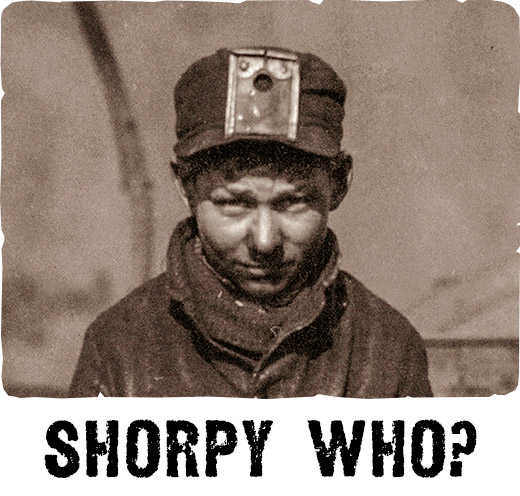
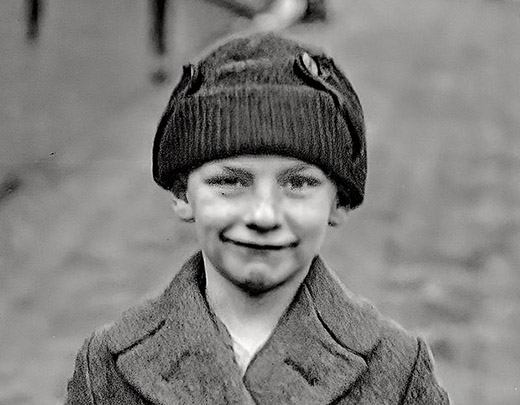
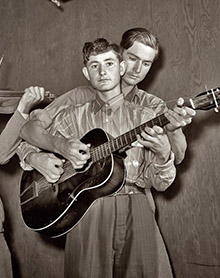
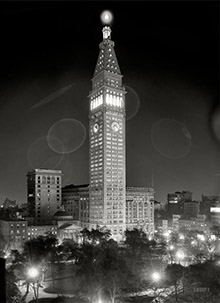
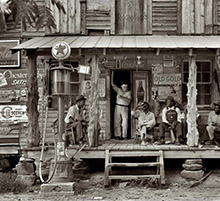
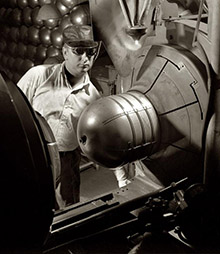
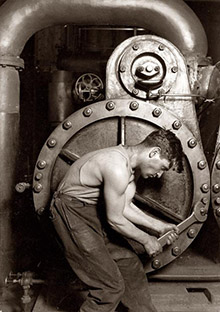

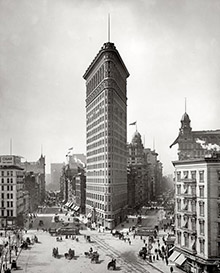



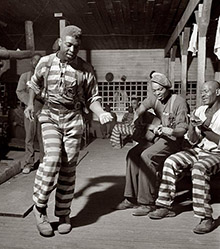
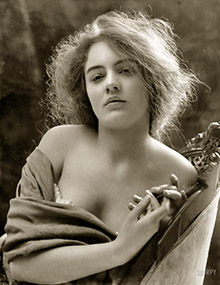
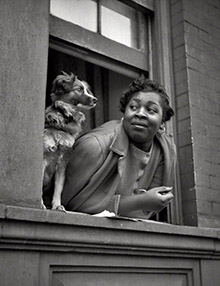

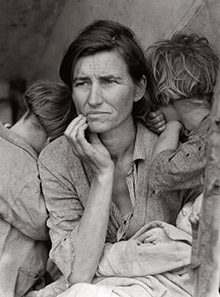

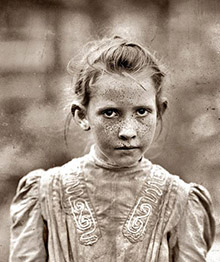
On Shorpy:
Today’s Top 5